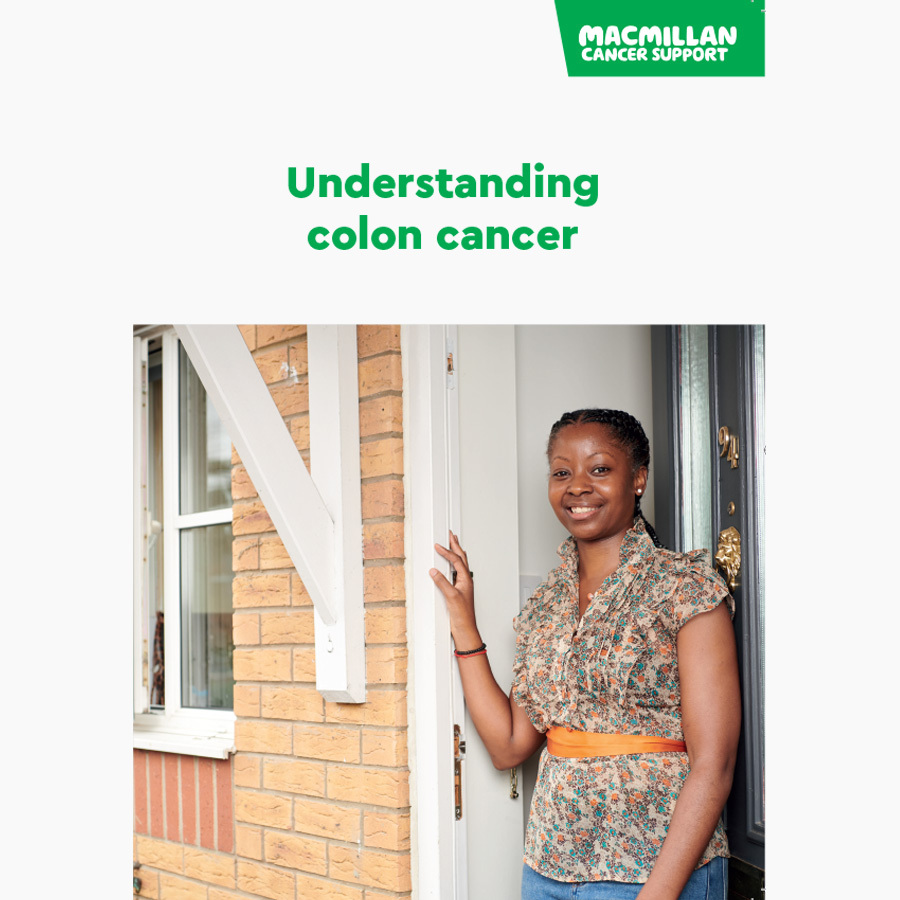Diagnosis of bowel cancer
A doctor may use tests such as a rectal examination to diagnose bowel cancer (colon or rectal cancer).
How bowel cancer is diagnosed
This information is about diagnosis of bowel cancer. Bowel cancer is a general term for cancer that starts in the colon or rectum. It is sometimes called colorectal cancer.
We have separate information about diagnosis of:
If you have symptoms of bowel cancer you will usually begin by having an appointment with your GP. They will ask you more about your symptoms. They will examine your tummy area (abdomen) to feel for anything unusual, such as a swelling.
Your GP may do the following tests:
-
Rectal examination
A rectal examination is when the GP gently inserts a gloved, lubricated finger into your back passage (rectum) to feel for anything unusual. A rectal examination is quick. It might be uncomfortable, but it should not be painful.
-
Blood samples
Your GP may take some blood samples to check for things such as anaemia. Anaemia is when you a have low number of red blood cells.
-
Faecal immunochemical test (FIT)
A faecal immunochemical test (FIT) checks for tiny amounts of blood hidden in your poo (stools). It is an important test that can help tell your doctor whether you need further tests.
In some people, bowel cancer is diagnosed after they have been admitted to hospital with a complication, such as a blockage in the bowel.
Macmillan is here to support you. If you would like to talk, you can:
- call the Macmillan Support Line for free on 0808 808 00 00
- chat to our specialists online
- visit our bowel (colon and rectal) cancer forum to talk to people who have been affected by bowel cancer, share your experience, and ask an expert your questions.
Booklets and resources
Urgent referral
If your GP thinks cancer may be causing your symptoms, they will refer you to a specialist doctor at a hospital. GPs can use cancer referral guidelines to decide who should have an appointment to see a specialist within 2 weeks. This is sometimes called an urgent referral.
You may have an urgent referral for bowel cancer for the following reasons:
- You are aged 40 or over and have weight loss and tummy pain for no obvious reason.
-
You are under 50 and have rectal bleeding and also have any of these symptoms:
- tummy pain
- changes in bowel habit
- weight loss
- iron deficiency anaemia.
- You are 50 or over and have rectal bleeding for no obvious reason.
- You are 60 or over and have any of these:
- iron deficiency anaemia
- changes in your bowel habit
- hidden blood in your poo (stools), according to FIT results.
A lump in your rectum or tummy
If you have a lump in your rectum or tummy, your GP can arrange an urgent referral, no matter your age.
No rectal bleeding
If you do not have rectal bleeding, your GP may ask you to do a FIT if you are:
- aged 50 or over and have tummy pain or weight loss
- under 60 and have changes in your bowel habit or iron deficiency anaemia
- aged 60 or over and have iron deficiency anaemia.
Bowel screening
Some people are diagnosed through the NHS Bowel Screening Programme. Bowel screening is a way of finding bowel cancer at an early stage before it causes symptoms. You are sent a home test kit every 2 years. This is usually a FIT to collect a poo (stool) sample. The age it starts depends on the UK country you live in.
Some people with a family history of bowel cancer have bowel screening at an earlier age.
At the hospital
The specialist doctor will ask you about your general health and any previous medical problems you have had. They will also ask whether you have a family history of bowel cancer.
The doctor will examine your tummy area and do a rectal examination. You usually have a blood sample taken to check your level of red blood cells. If you have a low number of red blood cells, this is called anaemia.
You also have blood tests to check whether your liver and kidneys are working normally.
Your doctor will decide which other tests you need based on:
- your symptoms
- the tummy and rectal examinations
- the results of your blood tests.
-
Colonoscopy
You can usually have most tests as an outpatient. This means you can usually go home soon afterwards. You may need someone to collect you from the hospital.
A colonoscopy is the main test used to diagnose bowel cancer. A colonoscopy looks at the inside of the whole length of the large bowel. During the test, they take samples of tissue (biopsies) from any areas of that look abnormal.
-
Sigmoidoscopy
A sigmoidoscopy looks at the inside of the rectum and the part of the colon closest to the rectum (the sigmoid colon).
During the test, they take samples of tissue (biopsies) from any areas of that look abnormal.
-
Virtual colonoscopy (CT colonography)
If a colonoscopy did not give clear enough pictures, you may have a virtual colonoscopy. A CT scanner takes a series of x-rays that build up a three-dimensional (3D) picture of your bowel. You will have 2 CT scans – 1 lying on your back and 1 lying on your front.
In the video below, Oncologist Rebecca and Cancer Nurse Specialist Claire explain how bowel cancer may be treated. They talk about surgery, chemotherapy, radiotherapy, immunotherapy and targeted therapies.
Further tests
If any of your biopsies show cancer in the colon, you will have more tests. These are to find out the size and position of the cancer and whether it has spread. This is called staging.
The test results will help you and your doctor decide on the best treatment for you. You may have any of the following tests:
Tests on the cancer cells
Doctors may do more tests on the bowel cancer cells taken during a biopsy or surgery.
They can test the cancer cells for changes (mutations) in certain genes. These gene changes are not inherited. The results help doctors decide which cancer drug treatments are more likely to work for you if you have advanced bowel cancer.
Tests on the cancer cells can also help you and your doctor decide whether you need genetic testing. Genetic testing may tell you whether you have bowel cancer caused by an inherited condition called Lynch syndrome.
About our information
This information has been written, revised and edited by Macmillan Cancer Support’s Cancer Information Development team. It has been reviewed by expert medical and health professionals and people living with cancer.
-
References
Below is a sample of the sources used in our bowel cancer information. If you would like more information about the sources we use, please contact us at
informationproductionteam@macmillan.org.uk
National Institute for Health and Care Excellent (NICE). Colorectal cancer. NICE guideline [NG151]. Updated December 2021. Available from: www.nice.org.uk/guidance/NG151 [accessed Jan 2023].
Cervantes A, Adam R, Rosello S, et al. Metastatic colorectal cancer: ESMO Clinical Practice Guideline for diagnosis, treatment and follow-up. Annals of Oncology. 2023;34(1):10-32. Available from: www.annalsofoncology.org [accessed Jan 2023].
Date reviewed

Our cancer information meets the PIF TICK quality mark.
This means it is easy to use, up-to-date and based on the latest evidence. Learn more about how we produce our information.
We want everyone affected by cancer to feel our information is written for them.
We want our information to be as clear as possible. To do this, we try to:
- use plain English
- explain medical words
- use short sentences
- use illustrations to explain text
- structure the information clearly
- make sure important points are clear.
We use gender-inclusive language and talk to our readers as ‘you’ so that everyone feels included. Where clinically necessary we use the terms ‘men’ and ‘women’ or ‘male’ and ‘female’. For example, we do so when talking about parts of the body or mentioning statistics or research about who is affected.
You can read more about how we produce our information here.








